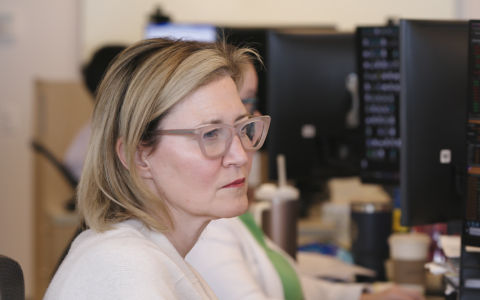- Geopolitical Strategist
Skip to main content
- Funds
- Insights
- Capabilities
- About Us
- My Account
United States, Institutional
Changechevron_rightThank you for your registration
You will shortly receive an email with your unique link to our preference center.
The views expressed are those of the authors at the time of writing. Other teams may hold different views and make different investment decisions. The value of your investment may become worth more or less than at the time of original investment. While any third-party data used is considered reliable, its accuracy is not guaranteed. For professional, institutional, or accredited investors only.
The scenario playing out between Israel and Iran remains the most likely path to a wider conflict that would matter to markets. My usual advice in situations like this remains the same: These are highly fluid geopolitical developments and are therefore rife with incomplete information and, in some cases, misinformation. In such a challenging information environment, exercise extreme caution and patience regarding the veracity of events while at the same time expanding your imagination about a wider set of potential outcomes and what those outcomes could mean to portfolio exposures and investment strategies.
I’ve moved my base case of a wider regional war to 45% (up from the historically high 35% prior to Iran’s missile launch). So, essentially, I believe this is now a coin flip and therefore demands wider portfolio attention. While I remain hopeful on the margin that US military deterrence and clear/aggressive diplomacy toward Iran and Israel can keep this conflict under relative control, the situation continues to escalate and each development brings a new set of uncertainties.
Here are two uncertainties I’m watching closely from here:
As for the bigger-picture investment implications, my larger and most important point remains the same: Iran’s attack on Israel is yet another indication that the geopolitical backdrop remains the most dangerous, unstable, and unpredictable environment in decades. In such conditions, world leaders are more likely to take greater policy risks if they believe core national security issues are at stake (true here for both Israel and Iran). From an investment perspective, this structurally higher geopolitical risk continues to force policymakers around the world, including on Capitol Hill, to prioritize national security issues, sometimes at the expense of economic efficiency, which should support long-term national security themes including legacy defense, defense innovation, and climate adaptation/resilience.
Experts

Emerging markets under Trump 2.0: expect the unexpected
Continue readingA guide to investing in the age of anxiety
Continue readingTrump 2.0: US election market impacts
Continue readingIt’s different this time: Trump faces challenging geopolitical dynamics
Continue readingBy
URL References
Related Insights
Get our latest market insights straight to your inbox.
Thank you for your registration
You will shortly receive an email with your unique link to our preference center

What’s the Fed got to do with it? The impact of rate cuts on CLO equity
Our CLO experts discuss the implications of Fed rate cuts on CLO equity, emphasizing its potential to maintain income amidst rate sensitivity challenges in other credit assets.

Commercial real estate debt: Transitional assets deep dive
Our private commercial real estate debt experts explore transitional CRE assets, highlighting their key characteristics, how they differ from other parts of the CRE debt universe, their potential roles in a portfolio, and much more.
Multiple authors

Investment-grade private credit market deep dive
Emeka Onukwugha and Elisabeth Perenick explore the evolving investment-grade private credit market, highlighting its key characteristics, liquidity profile, roles in a portfolio, and much more.

Private credit roundtable: The role of covenants
Our private credit team explores the evolving role of covenants in today’s private credit landscape, highlighting their continued importance despite differing availability in specific markets.
Multiple authors

Commercial real estate debt market update
Our private credit team discusses the CRE debt market's growth, evolving dynamics, and opportunities for private lenders amid higher rates and reset valuations.
Multiple authors

IPOs aren’t dead, they’re just napping
Experts from our venture capital and trading teams explore the current IPO landscape. They highlight three challenges and three opportunities for private companies aiming to go public today.
Multiple authors

CLOs and the growth of private credit
Alyssa Irving profiles private credit's influence on CLOs, focusing on its ability to refinance lower-quality issuers and the potential benefits for the broadly syndicated market.

Private credit: Is the illiquidity premium still worth it?
Our private credit team explores the value of the asset class’s illiquidity premium in today’s uncertain markets.

CLO investing and active ETFs
Alyssa Irving explores the evolving role of active ETFs in the AAA CLO market, highlighting their significant growth, the impact of increased trading activity, and the potential opportunities they create.

Deep dive on CLO equity investing
Alyssa Irving, Fixed Income Portfolio Manager, discusses the CLO equity asset class, highlighting its diversification potential, risk-return dynamics, and the crucial role of managers.
URL References
Related Insights
© Copyright 2026 Wellington Management Company LLP. All rights reserved. WELLINGTON MANAGEMENT ® is a registered service mark of Wellington Group Holdings LLP. For institutional or professional investors only.
Enjoying this content?
Get similar insights delivered straight to your inbox. Simply choose what you’re interested in and we’ll bring you our best research and market perspectives.
Thank you for joining our email preference center.
You’ll soon receive an email with a link to access and update your preferences.
Monthly Market Review — September 2025
A monthly update on equity, fixed income, currency, and commodity markets.
By